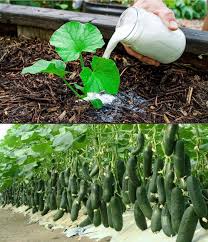For gardeners and cucumber lovers alike, there’s nothing more satisfying than harvesting a bountiful crop of fresh, crunchy cucumbers straight from the garden. But did you know you can double your cucumber yield by using natural fertilizers? In this guide, we’ll discuss the best organic fertilizers and methods to enhance your cucumber harvest and ensure your garden thrives. Prepare to unlock the full potential of your cucumber plants for an abundant harvest.
1. The Power of Organic Fertilizers
Natural fertilizers do more than just nourish your plants; they also improve soil health by enriching it with essential nutrients. Unlike synthetic fertilizers, organic options enhance soil structure, promote beneficial microorganisms, and reduce the risk of chemical runoff. By choosing organic fertilizers, you’re fostering a healthier, more sustainable garden environment.
2. Compost: The Gardener’s Gold
Compost is a gardener’s best friend. It’s packed with essential nutrients and improves soil fertility and moisture retention. By incorporating compost into your cucumber beds, you provide a steady supply of nutrients throughout the growing season. This promotes vigorous plant growth and increases cucumber production, ensuring a healthier and more productive garden.
3. Worm Castings: A Nutrient-Rich Boost
Worm castings, or vermicompost, are incredibly rich in nutrients and beneficial microorganisms. These tiny treasures improve soil structure and support healthy root development in cucumber plants. Adding worm castings to your soil or using them as a top dressing can drastically boost your cucumber yield, ensuring robust plant health and abundant fruit.

4. Fish Emulsion: A Natural Nitrogen Source
Fish emulsion is a powerful, organic fertilizer that provides a natural source of nitrogen—an essential nutrient for cucumber growth. Nitrogen promotes lush foliage and strong vine growth, which directly supports fruit production. Applying diluted fish emulsion during the growing season gives your cucumber plants the nitrogen boost they need to thrive.
5. Liquid Seaweed Extract: A Complete Nutrient Package
Liquid seaweed extract is a bio-stimulant loaded with growth hormones, trace elements, and essential nutrients. It enhances cucumber plant resilience, improves nutrient absorption, and encourages overall plant health. Regular foliar spraying with liquid seaweed extract can significantly improve cucumber yields, making it an indispensable tool for any gardener.
6. Epsom Salt: Magnesium for Healthy Cucumbers
Epsom salt, or magnesium sulfate, is crucial for cucumber plants as it supports chlorophyll production and photosynthesis. Magnesium deficiency can limit cucumber growth, but a foliar spray of Epsom salt solution can correct this imbalance, leading to healthier plants and a more abundant fruit crop.
7. Mulching for Moisture and Temperature Control
Mulching is a simple yet effective way to support cucumber growth. By applying mulch around your cucumber plants, you retain moisture, regulate soil temperature, and suppress weed growth. This creates a favorable environment for cucumbers, reducing water stress and encouraging strong, healthy plants.
8. Proper Watering and Sunlight
While natural fertilizers are key to boosting yields, don’t overlook the importance of watering and sunlight. Cucumbers thrive in well-watered soil and full sun. Ensure your plants receive at least 1 inch of water per week and enjoy ample sunlight to support healthy growth and fruiting.
Conclusion
By using natural fertilizers like compost, worm castings, fish emulsion, liquid seaweed extract, and Epsom salt, you can effectively double the yield of your cucumber plants. Combine these organic techniques with proper watering and sunlight, and you’ll soon be enjoying an impressive cucumber harvest. With a little care, your cucumber plants will flourish, providing you with a bounty of delicious, homegrown cucumbers for salads, pickles, and more. Happy gardening!
